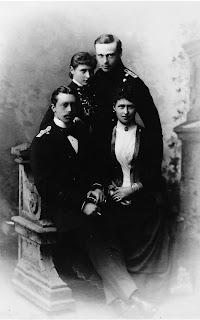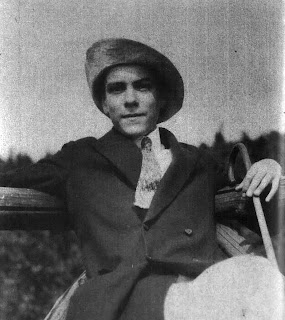This evening (July 16-17) we reach the fateful centennial of the martyrdom of the Russian Imperial Family.
On the evening of July 16/17, 1918, Tsar Nicholas II, Empress Alexandra Feodorovna, Grand Duchess Olga Nicholaevna, Grand Duchess Tatiana Nicholaevna, Grand Duchess Marie Nicholaevna, Grand Duchess Anastasia Nicholaevna, and Tsesarevich Alexei Nicholaevich, accompanied by four loyal servants, were assassinated by Yakov Yurovski and his posse in the basement of the Ipatiev House in Yekaterinburg, the most Bolshevik city in post-Tsarist Russia.
The Imperial Family were kept under various forms of house arrest for nearly 17 months, starting immediately after the abdication of Tsar Nicholas II. This imprisonment brought them from the Alexander Palace in Tsarskoe Selo, to the Governor’s Mansion in Tobolsk, ending inside the lugubrious prison that the Ipatiev House eventually became.
At times, the Imperial Family were treated with respect and deference. Contact with the outside world was sporadic. Visitors were few and far between. Members of the former ruling dynasty were kept at bay. Some messages managed to get to them; replies managed to get out. It was nearly 17 months of difficulty for the Tsar and his entourage. They arrived in Tobolsk with a retinue of nearly 40 staff. By the time Yurovsky sealed their fate, only four loyal servants remained. They would also be martyred in that small basement in Yekaterinburg.
Tsar Nicholas and ten other victims met a harrowing end at the hands of their jailers. Barrages of bullets came in deadly waves. Smoke filled the room. The stench of gunpowder, blood and flesh … the presence of death overpowering. Those who were not killed by the bullets, were stabbed and rifle butted. It was a frenzy of brutality; a vicious culmination to a heinous act.
The bodies were disposed later that early morning. Their whereabouts remained unknown for over six decades. When finally found, the site was kept secret for fear of Soviet retaliation.
In death, Tsar Nicholas II and his legacy were vilified, as was the entire tsarist period. Was he an effective ruler? That is a question over which entire books have been written. As a political leader, Nicholas II left much to be desired. yet, he was a product of his environment. As a husband, although loving, devoted, and loyal, he allowed his love for his wife to cloud his better judgement. As a father, Nicholas II seems to have excelled. His children were devoted to him, just as he was devoted to them. As Head of House Russia, Nicholas II failed. Many have criticized other Romanovs for seeking to save themselves from the revolutionary tsunami that engulfed Mother Russia. Yet, as Head of House, Nicholas II forgot that he was responsible for the survival of his dynasty. He isolated himself from other Romanovs. He caused an unbridgeable rift within the dynasty. He ignored their warnings. He led the Romanovs into an abyss of death, poverty and exile.
And yet, Nicholas II did not deserve to die in the manner that Yurovsky and his minions secured his horrific ending. His wife, their children, and those four loyal servants, did not deserve to meet the death that was reserved for them.
Let us not forget as we observe this dreadful centennial that many other members of the dynasty met equally harrowing deaths.
The night after the murders in Yekaterinburg, six other Romanovs met a brutal end in a forest outside there town of Alapaievsk. This second group of martyrs included: Grand Duchess Elisabeth Feodorovna, Grand Duke Sergei Mikhailovich, Prince Ioann Konstantinovich, Prince Konstantin Konstantinovich, Prince Igor Konstantinovich, and Prince Vladimir Pavlovich Paley, as well as Sister Barbara, Elisabeth Feodorovna’s faithful companion. Their end was just as vicious as that met by the Yekaterinburg martyrs.
Nearly a month before the ghastly events of Yekaterinburg, Grand Duke Michael Nicholaevich and his faithful secretary were brutally assassinated outside Perm.
And yet, the Bolshevik butchery was not at an end…
In January 1919, four other Grand Dukes were executed inside the walls of the Peter and Paul Fortress: Paul Alexandrovich, Dimitri Konstantinovich, Nicholas Mikhailovich, and George Mikhailovich.
Today, as we remember the victims of Yekaterinburg, Alapaievsk, Perm, and Petrograd, we must be reminded that violence begets violence. Imperial Russia, as difficult as it was for many, does not compare in the brutality and reign of terror that ensued. Modern Russia deserves better than what it has…for the reign of Putin is far worse than the Romanovs ever inflicted on their subjects.
May They Rest in Peace …






































